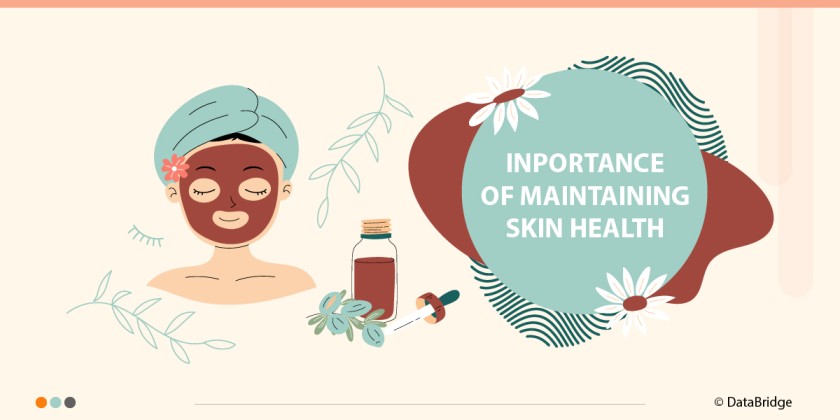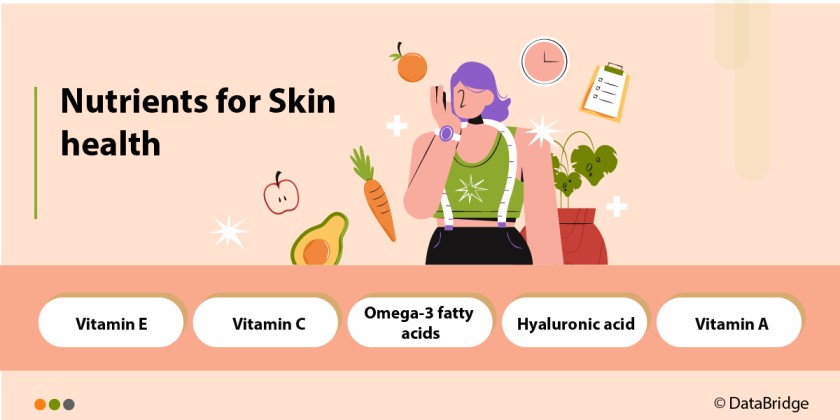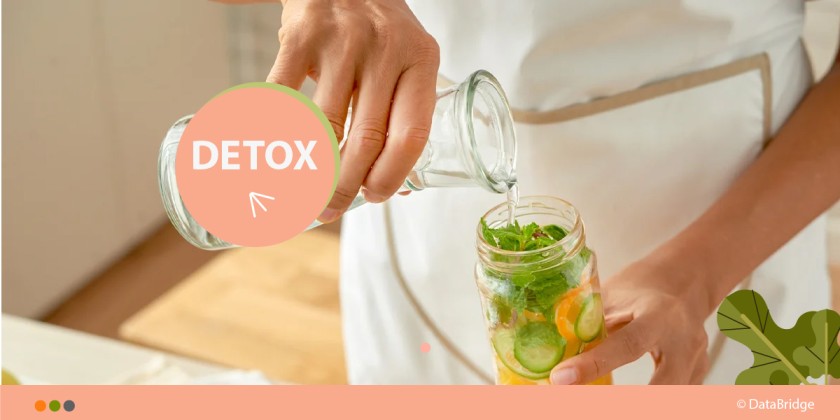Introduction
The beauty drinks market has seen a significant surge in recent years, driven by a growing consumer interest in health and wellness. Women, in particular, have shown a strong inclination towards products that simplify their beauty routines while enhancing their overall well-being. The beauty drinks market, a niche within the broader functional beverages sector, is gaining traction as consumers increasingly seek convenient and effective ways to support their beauty and health regimes.
This white paper explores the strategic approaches adopted by beauty drink market players to cater to this demand, focusing on the development of products aimed at promoting hydration and skin elasticity. This document also examines the market dynamics, consumer preferences, product innovations, and future trends, providing a comprehensive overview from the perspective of beauty drink market players.
The skin tightening market is expected to witness market growth at a rate of 9.15% in the forecast period of 2021 to 2028. Data Bridge Market Research report on skin tightening market provides analysis and insights regarding the various factors expected to be prevalent throughout the forecast period while providing their impacts on the market’s growth. The rise in the number of cosmetic procedures performed every year is escalating the growth of skin tightening market.

To know more about the study, visit: https://www.databridgemarketresearch.com/reports/global-skin-tightening-market
Market Overview
The beauty drinks market has experienced robust growth in recent years, driven by evolving consumer preferences and advancements in formulation technologies. In today’s world, the market for beauty beverages is likely to expand, with a focus on products promoting skin hydration and elasticity. Key players in this market segment are strategically positioning themselves to cater to the growing demand for convenient and effective beauty solutions.
Trends Driving Beauty Drinks Market Growth
Nutritional beverages known as beauty drinks promote anti-aging effects, skin brightening, and reduction in the visibility of acne, scars, and pigmentation. These drinks assist in detoxifying the skin by harnessing botanical extracts from vegetables and fruits, coupled with essential amino acids, vitamins, minerals, and antioxidants. The rising popularity of beauty drinks stems from a significant global shift in consumer lifestyles. Aging customers worldwide seek specialized solutions to enhance their appearance, reflecting evolving requirements and expectations. Moreover, beauty drinks contribute to skin tightening and the maintenance of healthy nails and hair. Consequently, the market is poised for substantial growth over the next years. Several trends are driving the growth of the beauty drinks market, including:
Consumers are increasingly prioritizing wellness, seeking products that offer both aesthetic benefits and health-enhancing properties. Beauty drinks align with this trend by providing a holistic approach to skincare from within.
Protein-rich beauty drinks are poised to dominate with a considerable share of the market in the forecast period, primarily due to their pivotal role in skincare routines, driving the market growth. Regular consumption of these protein-packed beverages aids in rejuvenating the complexion from within. They offer a range of anti-aging benefits, such as enhanced hair and skin health, joint revitalization, and gut healing.
- Simplicity and Convenience
Busy lifestyles have prompted consumers to seek simplified beauty routines. Beauty drinks offer a convenient way to nourish the skin from within, eliminating the need for multiple skincare products. Beauty drinks with functional ingredients, such as antioxidants and vitamins, are gaining traction. These ingredients are believed to protect the skin from damage caused by free radicals and promote healthy skin.
- Natural and Functional Ingredients
There is a growing preference for products formulated with natural ingredients known for their skin-enhancing properties. Beauty drinks often contain ingredients such as collagen, hyaluronic acid, antioxidants, and vitamins, which are touted for their hydrating and anti-aging benefits.
Beauty beverages frequently contain collagen peptides, which stimulate the production of natural collagen cells and reduce premature wrinkles. Collagen-based drinks are in high demand as part of the growing interest in beauty beverages offering anti-aging benefits, particularly focusing on facial, scalp, and nail health.
The increasing consumer awareness of the benefits of collagen peptides and tripeptides in human nutrition has gained traction in both the nutrition and cosmetic sectors. This trend has propelled the global emergence of nutria-cosmetic solutions.

Consumer Behavior and Preferences
The demand for beauty drinks has seen significant growth in recent years, driven by the increasing consumer demand for products that offer beauty benefits in addition to regular skincare routines. The increasing focus on personal well-being and beauty enhancement has driven the demand for beauty drinks. Women constitute the primary consumer base for beauty drinks, particularly those aged 25-45. This demographic values products that offer convenience, efficacy, and align with their lifestyle and wellness goals.
With the rise of social media and the desire for picture-perfect appearances, consumers are increasingly turning to beauty drinks as a convenient and effective way to achieve their beauty goals. Consumer behavior in the beauty drinks market is shaped by various factors, including:
- Desire For Visible Results
Consumers seek products that deliver tangible results, such as improved skin hydration and elasticity. Beauty drinks that promise these benefits are appealing to individuals looking to enhance their appearance. Consumers, particularly those mindful of beauty, are increasingly seeking natural and improved methods to maintain youthful skin for an extended period. Beauty drinks have emerged as a favored solution in this quest. Technological advancements and enhanced data management have facilitated significant market expansion, attracting a growing base of online customers as well.
- According to the NHS, approximately 95% of individuals aged 11 to 30 experience some degree of acne, with the condition being most prevalent among girls aged 14 to 17. With increasing awareness of beauty drinks that promote healthy aging and enhance skin, hair, and nail health, there has been a rising demand for beauty drinks, particularly those based on collagen.
Trust in Brand Reputation
Brand reputation significantly influences consumer choices. Established brands known for providing effective beauty solutions hold a competitive edge in the market.
- Influence of Social Media
Social media platforms serve as influential channels for beauty trends and product recommendations. Consumers often discover new beauty drinks through social media influencers and online reviews.
The ascendancy of social media and influencer marketing has a significant impact on the beauty drinks market. Through diverse online platforms, consumers are exposed to trends in beauty and wellness, shaping their buying choices. Endorsements and testimonials from influencers and celebrities enhance the visibility and appeal of beauty drinks, fostering consumer confidence and capitalizing on market growth.
Below are some stats that show a rise in the influence of social media in the application of skin care products,
- In August 2021, according to a blog published by Happi magazine, regarding skincare, 39% of respondents indicated that social media influenced them to try a new product
Product Innovations and Development
In response to consumer demand, beauty drink manufacturers are investing in product innovation and development. Beauty highlights the industry's focus on creating beverages that target specific skin concerns. Formulations may include a blend of botanical extracts, vitamins, and minerals designed to promote hydration, collagen production, and overall skin health.
Innovations in formulations and product strategies play a pivotal role in shaping the beauty drinks market. Ongoing research and development endeavors focus on introducing new ingredients with proven skincare benefits while enhancing the taste and convenience of these beverages.
Market players frequently engage with nutritionists, dermatologists, and wellness experts to craft formulations that align with consumer preferences and deliver tangible results. Challenges such as skepticism regarding the efficacy of beauty drinks and competition from conventional skincare products influence market dynamics.

Below are some new product developments and innovations offered by key players in the beauty drinks industry:
- In July 2023, Iconic Beauty unveiled its latest innovation: The Secret Ingredient, which embodies the essence of empowering individuals to enhance their best selves, promoting a look-good, feel-good, and do-good ethos. This product aims to inspire and uplift consumers, encouraging them to embrace their true brilliance
- In October 2021, Sappe PCL announced two new beauty beverages with a less sweet mix that assist in enhancing immunity while also enhancing skin complexion
- In May 2020, Oriflame Cosmetics collaborated with design studio Butterfly Cannon to develop Wellness Aqua Glow, a beauty drink combining Ceramosides and lingonberries
Major industry players such as Nestlé and Coca-Cola are engaged in research and development endeavors aimed at advancing beauty drink formulations.
- Nestlé's Glowelle, comprising a blend of antioxidant vitamins, phytonutrients, and botanical fruit extracts, is tailored to counteract aging indicators by nurturing the skin. In addition, Nestlé has introduced a collagen coffee variant, positioned as a healthier alternative to traditional coffee, with purported skin benefits
- Vitabiotics have entered the fray with their offerings, such as skin and hair beauty drinks containing hydrolyzed marine collagen, inositol, blackcurrant seed oil, and amino acids. This diversification in product offerings underscores the expanding demand for beauty drinks
- Notably, industry giants such as Coca-Cola have sought partnerships, exemplified by collaborations with entities such as Sanofi SA to introduce products such as the "Beeno Oenobiol" beauty drink
- Other beauty beverage innovations to note include superfood beauty tonics such as the Cluo Juices range which is infused with skin-perfecting ingredients
The core of beauty drinks lies in their ingredients, which are selected for their ability to support skin health, particularly hydration and elasticity. Manufacturers are focusing on sourcing high-quality, bioavailable ingredients to maximize efficacy. Beauty drinks’ manufacturers are also using botanical extracts and ingredients such as aloe vera, green tea, and turmeric are rich in antioxidants and have anti-inflammatory properties. These are commonly included in products like Nestlé Skin Health’s beauty drinks.
To enhance the effectiveness and consumer appeal of beauty drinks, manufacturers are employing several innovative formulation strategies such as nano-encapsulation, flavor masking, and combining ingredients that work synergistically enhances the overall efficacy of the product, among others.
The beauty drinks market is characterized by continuous innovation and product development, driven by consumer demand for effective, convenient, and aesthetically pleasing solutions for skin health and beauty. Manufacturers are at the forefront of these advancements, leveraging cutting-edge technologies, premium ingredients, and sustainable packaging practices to create products that resonate with modern consumers. By staying abreast of emerging trends and evolving consumer preferences, beauty drink manufacturers are poised to drive significant growth and differentiation in this dynamic market.
Marketing and Branding Strategies
Successful marketing and branding strategies are essential for capturing consumers' attention and building brand loyalty. Consumers are increasingly drawn to products that provide dual advantages, merging skincare with cosmetic benefits. Ultimately, future marketing strategies are expected to pivot around brand loyalty, anchored by ethical and sustainable practices. Key tactics employed by beauty drink companies include:
Collaborations with celebrities and influencers can help generate buzz and credibility for beauty drink brands. Endorsements from well-known figures in the beauty and wellness space can drive consumer interest and brand recognition.
Providing educational content about the benefits of beauty drinks and the science behind their formulations can help build consumer trust and loyalty. Brands may leverage various channels, including social media, blogs, and webinars, to educate consumers about skincare from within.
Compelling visual imagery and storytelling can enhance brand storytelling and resonate with consumers on an emotional level. Brands often use visually appealing packaging and lifestyle imagery to convey the aspirational qualities of their products.
Regulatory Landscape
The beauty drinks market is subject to regulatory oversight to ensure product safety and efficacy. Regulatory considerations may include compliance with labeling requirements, ingredient safety assessments, and marketing claims substantiation. Manufacturers must navigate regulatory requirements in each market where their products are sold to avoid compliance issues and maintain consumer trust.
The regulatory landscape for beauty drinks encompasses various aspects to ensure product safety, efficacy, and consumer protection. Here's an overview of key regulatory considerations:
Beauty drink manufacturers must adhere to labeling regulations stipulated by regulatory authorities. These requirements typically include accurate and clear labeling of ingredients, nutritional information, serving sizes, and product claims. Labels should not be misleading and must comply with standardized formats to facilitate consumer understanding.
Regulatory agencies evaluate the safety of ingredients used in beauty drinks to ensure they do not pose any health risks to consumers. Ingredients undergo rigorous assessment for potential allergens, contaminants, and adverse effects. Manufacturers are responsible for conducting safety assessments and providing supporting data to regulatory authorities.
- Health Claims Substantiation
Any health claims made by beauty drink manufacturers must be substantiated by scientific evidence. Regulatory bodies scrutinize claims related to skin health, hydration, and elasticity to verify their accuracy and validity. Manufacturers are required to provide supporting clinical studies or scientific research to substantiate these claims.
- Quality Control and Good Manufacturing Practices (GMP)
Beauty drink manufacturers are expected to adhere to GMP guidelines to ensure product quality, purity, and consistency. This includes maintaining hygienic production facilities, implementing quality control measures, and conducting regular inspections and audits to uphold manufacturing standards.
- Product Registration and Approval
In some jurisdictions, beauty drinks may require registration or approval from regulatory authorities before they can be marketed and sold to consumers. This process typically involves submitting product formulations, labeling information, and supporting documentation for review and evaluation.
- Advertising and Marketing Regulations
Regulatory agencies monitor advertising and marketing practices related to beauty drinks to prevent deceptive or misleading claims. Manufacturers must ensure that their promotional materials comply with regulatory guidelines and accurately represent the benefits and attributes of their products.
- International Harmonization
As beauty drinks are often sold in global markets, manufacturers may need to navigate regulatory differences across jurisdictions. International harmonization efforts aim to streamline regulatory requirements and facilitate market access for beauty drink products.
Overall, compliance with regulatory requirements is essential for beauty drink manufacturers to ensure product safety, consumer trust, and market access.
Future Outlook
The future of the beauty drinks market looks promising, with continued innovation driving product development and consumer adoption. Advancements in formulation technologies and ingredient science will likely lead to the creation of more productive beauty beverages targeting specific skin concerns. As consumers increasingly prioritize wellness and seek holistic beauty solutions, the demand for beauty drinks promoting hydration and skin elasticity is expected to grow.
Conclusion
The beauty drinks market is experiencing rapid growth, fueled by consumer demand for products that promote both aesthetic and wellness benefits. Manufacturers are responding to this demand by developing innovative beverages aimed at enhancing skin hydration and elasticity. Successful marketing strategies, coupled with a focus on natural and functional ingredients, are driving consumer engagement and brand loyalty. As the market continues to evolve, regulatory compliance and transparency will remain critical considerations for industry stakeholders. Looking ahead, the beauty drinks market is poised for further expansion as consumers embrace the concept of skincare from within as part of their daily beauty and wellness routines.


